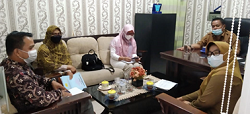Peningkatkan Pengetahuan Ibu Tunanetra tentang Kesehatan Kehamilan melalui Buku Suluh Bina Netra Sehat Reproduksi Berhuruf Braille The Improvement of Knowledge of Blind Mothers about Health in Pregnancy through Counseling using the Book “Suluh Bina Netra Sehat Reproduksi”
Main Article Content
Abstract
Blind women often experience discrimination in obtaining public services, such as securing access to health services. Most healthcare facilities they visit during pregnancy do not have information media they can read at home, such as the MCH book for pregnant women who do not have vision problems. In 2020, the service team developed reproductive health education media for blind mothers in Braille. Therefore, the solution we offer to partners is to provide health education using the book Suluh Bina Netra Healthy Reproductive Braille, which we have developed to increase mothers' knowledge about pregnancy check-ups. The methods used in this community service include the lecture method, question and answer, and discussion and practice. The aim is to provide health education to increase the understanding of blind women. The activity was carried out from July 31 to August 15, 2021, with 14 blind mothers. There was an increase in the score on the post-test after the client was given education about pregnancy checks using books, from an average of 3.14 to 5.43. Blind mothers were also satisfied with the activities carried out with an average score for material quality, namely 4.78, media 4.64, and activity benefits 4.78. The output of this activity is an increase in client knowledge after receiving education: the average post-test score increases, the intellectual property rights registration number EC00202185546 on October 14, 2021, and this book has also been launched directly by the Mayor of Padang on December 2, 2021, with a news link https://m.facebook.com/story.php?story_fbid=270755855084449&id=100064501097230&sfnsn=wiwspwa
Downloads
Article Details

This work is licensed under a Creative Commons Attribution-ShareAlike 4.0 International License.
Authors who publish with this journal agree to the following terms:
- Any article on the copyright is retained by the author(s).
- Author grant the journal, right of first publication with the work simultaneously licensed under a Creative Commons Attribution License that allows others to share work with acknowledgment of the work authors and initial publications in this journal.
- Authors are able to enter into a separate, additional contractual arrangements for non-exclusive distribution of published articles of work (eg, post-institutional repository) or publish it in a book, with acknowledgment of its initial publication in this journal.
- Authors are permitted and encouraged to post their work online (e.g., in institutional repositories or on their websites) prior to and during the submission process, as can lead to productive exchanges, as well as earlier and greater citation of published work.
- The article and any associated published material is distributed under the Creative Commons Attribution-ShareAlike 4.0 International License
References
Chant, S. 2010. The International Handbook of Gender and Poverty: Concepts, Research and Policy. Cheltenham, UK: Edward Elgar.
Kabeer, N. 2008. Mainstreaming Gender in Social Protection for the Informal Economy (New Gender Mainstreaming in Development Series). 1st Edition. London, UK: Commonwealth Secretariat.
Lestari, W., Fitlya, R. 2021. Citra Diri Penyandang Tunanetra terhadap Diskriminasi dari Lingkungan Sosial. Psikologi konseling : Jurnal Kajian Psikologi dan Konseling. 19(2):1159-1169. https://doi.org/10.24114/konseling.v19i2.30476
Malouf, R., Henderson, J., Redshaw, M. 2017. Access and quality of maternity care for disabled women during pregnancy, birth and the postnatal period in England: Data from a national survey. BMJ Open. 7(7)e016757. https://doi.org/10.1136/bmjopen-2017-016757
Muthmainnah, R.N. 2015. Pemahaman Siswa Tunanetra (Buta Total Sejak Lahir Dan Sejak Waktu Tertentu) Terhadap Bangun Datar Segitiga. Fibonacci: Jurnal Pendidikan Matematika dan Matematika. 1(1):15-27. https://doi.org/10.24853/fbc.1.1.15-27
Persatuan Tunanetra Indonesia. 2017. Press Release: International Women’s Day 2017. https://pertuni.or.id/press-relese-international-womens-day-2017/
Pradopo, S. 1977. Pendidikan Anak-anak Tunanetra. Jakarta: Departemen Pendidikan dan Kebudayaan Republik Indonesia.
Rudiyati, S. 2010. Pembelajaran Membaca dan Menulis Braile Permulaan pada Anak Tunanetra. Jurnal Asesmen Dan Intervensi Anak Berkebutuhan Khusus. 9(1):57-65. https://doi.org/10.17509/jassi.v10i1.3909
Suharmini, T. 2009. Psikologi Anak Berkebutuhan Khusus. Yogyakarta: Kanwa Publisher.
Sunesni, Furwasyih, D. 2020. Asesmen Tingkat Kepuasan Dan Persepsi Asuhan Antenatal Pada Ibu – Ibu Tunanetra Di Kota Padang (Studi Kasus). Jurnal Kesehatan Mercusuar. 3(2):13-23. https://doi.org/10.36984/jkm.v3i2.155
Tarsidi, D. 2012. Mengatasi Masalah-Masalah Psikososial Akibat Ketunanetraan pada Usia Dewasa. Jurnal Pendidikan dan Kebudayaan. 18(1):85-97. https://doi.org/10.24832/jpnk.v18i1.71
